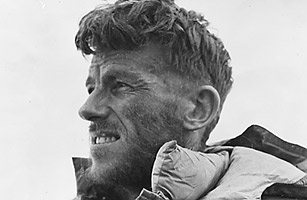
(7 of 7)
Are the leaders of these guided expeditions sufficiently talented?
They're usually pretty competent. But the climbers are certainly not as competent. I met one of Hall's groups. [New Zealander Rob Hall, a commercial guide, died in the 1996 storm at 28,700 feet, along with a client, an American named Doug Hansen.] One of Hall's clients told me that he'd never been on a mountain. But he had paid his $65,000 — or whatever — and felt he was going to be taken to the top and back safely for that money.
You could tell he was a poor climber?
He told us he wasn't a good climber.
What did Hall say when you asked him about taking such a guy up?
Rob Hall was a firm believer in the fact that he could get them up and down safely.
Did this thinking get Hall killed?
Well, I'm sure if he had been on Everest with a serious expedition, he'd have got himself off. But ... who was that man with Hall?
Hansen.
Hansen. Now, apparently Hansen had been on the mountain the previous year and had got quite high. But he couldn't handle the atmosphere well and was lucky he got off. To take a man who had had trouble back up a year later is taking a very big risk, a considerable chance indeed.
What was your reaction when you first learned of the tragedy?
While I expected it, I was obviously shaken. We actually heard a man dying on the mountain, talking to his wife as he was dying. [Hall had been patched through from just below the summit, and a tape recording of the telephone conversation was made.] This was very dramatic, very sad stuff.
My own personal feeling — I would have preferred to die peacefully alone and let the world find out about it later.
You say you expect it to happen again. Can anything be done to prevent such occurrences in the future?
Well, I certainly put some responsibility [for the tragedy] on the Nepalese government. I think they should allow only two or three expeditions a year. But I'll bet you they don't do it. To them, the money's too important. They have said they would reduce the number of expeditions and increase the cost to go on the mountain. Now, I don't agree with the vast sum because it makes it become essentially only a sport for the wealthy or the extremely well sponsored. On the other hand, I do agree with them cutting down on expeditions — but I'll bet you they don't do it.
Has the nature of mountaineering itself changed, and if so, does this add to the danger too?
There has been an erosion of mountaineering values. It used to be a team effort. Nowadays, it's much too everybody-for-himself. Tenzing and I got to the top together, it wasn't first one, then the other. Now it's every man for himself. Not much you can do about it. That's the way people are these days.
With a traffic jam on top of the mountain, can these climbers possibly get the same kind of joy out of summiting that once was available — that was available to you?
I don't think they do get the same type of joy. I think we were the lucky ones, really. We had to do everything, we had to establish the route, we had to carry the gear up, we had to pioneer upper parts of the mountain. So we were really, in many ways, the fortunate ones. I mean, those sorts of challenges simply don't exist anymore.
You were born at the right time for what you wanted to do.
We were born at the right time.
Do you still go walking?
Almost every day. June's a keen walker, and we have a route here in Auckland that we do. And we have two cabins, one in the bush and one near the shore. I love to go walking there. I still love to go out. My health is excellent — I'm not quite as lively as I used to be, but I'm still very active. I travel often, do lots of lecturing. I'm sort of a guest of honor at many of these events.
Such as the ones coming up for the 50th anniversary. Are you looking forward to all that?
I'm looking forward to seeing my many friends in all those places, and I think it's nice that people feel Everest was important. I expected there to be interest in it, but my involvement is geared to making certain the Sherpas are kept in people's minds. That's how I'd like to be remembered, you see: not for Everest, but for the work I did and the cooperation I had with my Sherpa friends.